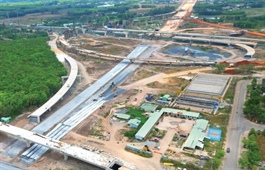New resolution offers promising pro-business reform roadmap
New resolution offers promising pro-business reform roadmap
Vietnam is advancing a roadmap to pro-business reform with a landmark directive, but the "chaebol-led" strategy has some drawbacks.
|
In May, the Politburo issued Resolution 68, a high-level Party directive that identifies private businesses as the key driving force of the economy, along with complementary Resolutions 198 and 139. Resolution 68 identifies a blueprint for sustaining economic growth in a pivot from the current development model, which largely centres on being a low-cost foreign direct investment (FDI) assembly hub.
According to Maybank Vietnam's analysts, the government aims to double the number of private enterprises by 2030, nurturing globally competitive large corporations and small- and medium-sized enterprises (SMEs) alike. Ambitiously, the state aims to develop 20 large private corporations integrated into global value chains by 2030. This is reminiscent of the South Korean chaebol-led model in which conglomerates drive employment, knowhow, and capital accumulation. Another key aim is for Vietnam to build leading capabilities in science, technology, and innovation.
The three resolutions aim to improve the business environment by reducing administrative burdens, enhancing tax incentives, increasing regulatory certainty and ensuring fair resource access for SMEs.
Administrative burdens, measured in terms of the time, cost, and procedural requirements for doing business, are targeted to be cut by 30 per cent by year-end. There will be tax incentives, regulatory sandboxes, and possibly preferential financing for research and development, high-tech, digital, and green transformation.
Key measures outlined to strengthen regulatory certainty include enhancing intellectual property protection, limiting inspections to once a year, shifting to a post-inspection regime, and avoiding criminalisation of commercial infractions (i.e. economic or civil violations).
To level the playing field for SMEs and startups, land will be set aside for these enterprises with 30 per cent rent discounts over five years and corporate income tax/personal tax exemptions. Public procurement contracts worth up to VND20 billion ($767,000) will be reserved for SMEs, and training will be provided for 10,000 directors and consulting services for SMEs to promote digitalisation.
Ministries and government agencies are formulating action plans and ironing out the specifics of these broad directives, which will likely emerge progressively ahead of the 14th National Party Congress, where the general secretary and other top leaders will stand for re-election by the Party Central Committee.
Maybank Vietnam's analysts stated, "The pro-business reforms could enhance FDI competitiveness and drive domestic investment. Besides fostering a more efficient business environment, stronger and more productive local enterprises would be welcomed by multinationals looking to localise supply chains (beyond assembly facilities) and reduce dependence on imported Chinese parts."
"That said, there could be several medium-term drawbacks to this new economic blueprint," the analysts noted. "The goal of doubling the number of private businesses and creating 20 large corporations (integrated into global supply chains and not just dominant within their home market) in just five years is very ambitious and resource-intensive."
In addition, a chaebol-like strategy will require significant government support to its “national champions” through subsidies, loans, and favourable regulations, with little of the pie left to support SMEs. As these chaebols grow to become increasingly dominant and politically connected, the risk is that of SMEs and foreign-invested enterprises facing an uneven playing field that reduces economic competitiveness. In addition, fostering state-favoured champions may lead to moral hazard risks, encouraging risky investments and suboptimal resource allocation.
- 12:15 18/06/2025




























